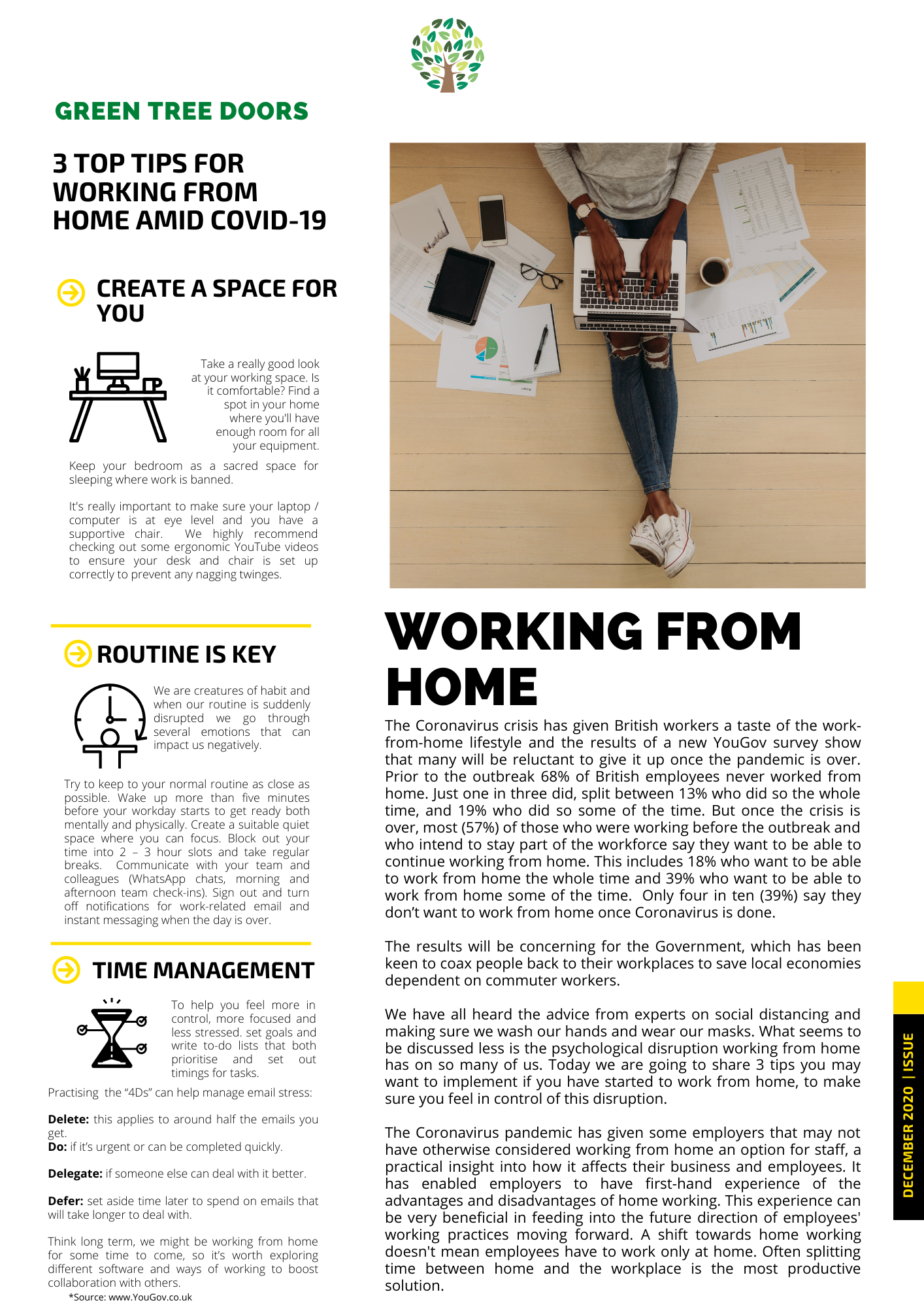Working From Home
Working From Home
The Coronavirus crisis has given British workers a taste of the work-from-home lifestyle and the results of a new YouGov survey show that many will be reluctant to give it up once the pandemic is over. Prior to the outbreak 68% of British employees never worked from home. Just one in three did, split between 13% who did so the whole time, and 19% who did so some of the time. But once the crisis is over, most (57%) of those who were working before the outbreak and who intend to stay part of the workforce say they want to be able to continue working from home. This includes 18% who want to be able to work from home the whole time and 39% who want to be able to work from home some of the time. Only four in ten (39%) say they don’t want to work from home once Coronavirus is done. The results will be concerning for the Government, which has been keen to coax people back to their workplaces to save local economies dependent on commuter workers. We have all heard the advice from experts on social distancing and making sure we wash our hands and wear our masks. What seems to be discussed less is the psychological disruption working from home has on so many of us. Today we are going to share 3 tips you may want to implement if you have started to work from home, to make sure you feel in control of this disruption. The Coronavirus pandemic has given some employers that may not have otherwise considered working from home an option for staff, a practical insight into how it affects their business and employees. It has enabled employers to have first-hand experience of the advantages and disadvantages of home working. This experience can be very beneficial in feeding into the future direction of employees’ working practices moving forward. A shift towards home working doesn’t mean employees have to work only at home. Often splitting time between home and the workplace is the most productive solution.
3 top tips for working from home AMID COvid-19
CREATE A SPACE FOR YOU
Take a really good look at your working space. Is it comfortable? Find a spot in your home where you’ll have enough room for all your equipment.
Keep your bedroom as a sacred space for sleeping where work is banned. It’s really important to make sure your laptop / computer is at eye level and you have a supportive chair. We highly recommend checking out some ergonomic YouTube videos to ensure your desk and chair is set up correctly to prevent any nagging twinges.
ROUTINE IS KEY
We are creatures of habit and when our routine is suddenly disrupted we go through several emotions that can impact us negatively.
Try to keep to your normal routine as close as possible. Wake up more than five minutes before your workday starts to get ready both mentally and physically. Create a suitable quiet space where you can focus. Block out your time into 2 – 3 hour slots and take regular breaks. Communicate with your team and colleagues (WhatsApp chats, morning and afternoon team check-ins). Sign out and turn off notifications for work-related email and instant messaging when the day is over.
TIME MANAGEMENT
To help you feel more in control, more focused and less stressed. set goals and write to-do lists that both prioritise and set out timings for tasks.
Practising the “4Ds” can help manage email stress: Delete: this applies to around half the emails you get. Do: if it’s urgent or can be completed quickly. Delegate: if someone else can deal with it better. Defer: set aside time later to spend on emails that will take longer to deal with. Think long term, we might be working from home for some time to come, so it’s worth exploring different software and ways of working to boost collaboration with others.
The COVID-19 crisis has given British workers a taste of the work-from-home lifestyle and the results of a new YouGov survey has shown that many are reluctant to return to office work after the pandemic comes to and end. Before COVID-19, 68% of British employees had never worked from home, just 1 in 3 did, split between 13% who did so the whole time and 19% of those who worked from home some of the time. Only 4 in ten say they don’t want to work from home once and if the COVID-19 pandemic ends.
The results will be concerning for the Government, which has been keen to coax people back to their workplace to save local economies dependent on commuter workers. We have all heard the advice from experts regarding social distancing and making sure we wash our hands and wear our masks. What seems to discussed less is the psychological disruption working from home has on so many of us. Here are 3 tips that maybe useful to implement if you have started working from home to help you feel more in control of the disruption.
- Create a Space for you – take a really good look at your working space, is it comfortable, is there enough space or light? Find a spot in your home where you’ll have enough room for all the equipment necessary to perform your job. If you can, try and keep it out of the bedroom as that should be seen as a sacred, relaxing space. It is really important to make sure your laptop/computer is at eye level and you have a supportive chair.
- Routine is Key – We are creatures of habit and suddenly having to work from home can disrupt this routine. Try to keep your routine as normal as possible. Wake up at the time you would if you were going into work, get dressed, have breakfast and start work at the time you normally would have done. Create a suitable quiet space where you can focus. Ensure you take regular breaks, stay hydrated and walk away from your screen during that break. Communicate with team members or colleagues over the phone, video calls and check in with them on a regular basis. Once work has finished, sign out, turn off notifications and clear away your work.
- Time Management – to help you feel more in control, more focused and less stressed, set goals and write to-do lists that both prioritise and set out timings for tasks. Practicing the 4 D’s can help manage email stress.
- Delete – this applies to around half the emails you get
- Do – if it’s urgent or can be completed quickly
- Delegate – if someone else can deal with it better
- Defer – set aside time later to spend on emails that will take longer to deal with.







